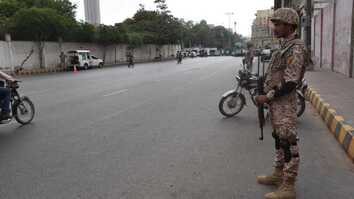KARACHI -- Concerned about militancy among youth studying in academic institutions, law enforcement agencies in Sindh Province have started working with university officials to seek help on the matter.
Vice-chancellors and representatives of the province's 40 universities, both public and private, met with Counter Terrorism Department (CTD) officials Wednesday (July 12) at the provincial police headquarters to discuss the potential spread of militancy on campuses and ways to counter it.
Headed by CTD Chief Sanaullah Abbasi, the participants of the meeting agreed for a co-ordinated and strong policy to curtail extremism in academic institutions and called for a joint strategy between universities and law enforcement agencies.
Militants eye educated youth
After shattering Taliban networks in on-going crackdowns in the province, law enforcement agencies are dealing with an emerging menace -- the involvement of educated youth in subversive activities.
"Investigations from the arrested militants show that terror outfits are active in the country's leading universities," Omar Shahid Hamid, a senior CTD official, told Pakistan Forward. "This is the reason we convened the meeting with university officials to prevent the alarming threat."
The CTD officers in the meeting discussed the cases of Saad Aziz and Naureen Leghari, two students recently arrested after they became radicalised and involved in terrorist acts.
Aziz was a graduate of the Institute of Business Administration in Karachi. He joined a local group inspired by the "Islamic State of Iraq and Syria" (ISIS).
Aziz, 27, confessed to involvement in a number of terrorist activities in Karachi, including the May 2015 killing of about 45 members of the Ismaili community in the Safoora Goth neighbourhood and the April 2015 murder of Sabeen Mehmud, a social worker and human rights activist.
A court handed him a death sentence in May 2016. He remains in custody.
Leghari, 20, a student at the Liaquat University of Medical and Health Sciences in Jamshoro District, was arrested in April in Lahore following a shootout with law enforcement personnel.
Lehgari confessed to going to Lahore with the intention of carrying out a suicide attack on a church during Easter, according to an interview broadcast on local television.
Fortunately, security forces raided the house where she and her accomplices were staying, killing terrorist Ali Tariq, and preventing the attack.
Leghari, who authorities say was deceived, was released from custody. She told reporters May 8 that she fell prey to ISIS recruiters though social media.
Pakistani army spokesperson Maj. Gen. Asif Ghafoor said he hopes Leghari's experience will be a lesson to others. "In this way, awareness will be created among the younger generation and parents as well as among institutions," he said May 10.
A concerning trend
The two cases presented Wednesday are indicative of a trend, observers say.
Extremist elements affiliated with global terrorist networks are eying academic institutions to recruit affluent youth, said Muhammad Amir Rana, director of the Pak Institute for Peace Studies, an Islamabad-based security think tank.
"They are self-radicalised individuals who are mainly influenced by militant ideologies and not formally affiliated with any local or global militant network," Rana told Pakistan Forward of radicalised students.
University representatives also discussed their views on the growing threat of militancy on campus and put forward their suggestions to stop the trend.
A number of universities have already taken steps to overcome the threat of militancy.
For example, Shaheed Benazir Bhutto University in Shaheed Benazirabad District set up a vigilance team after the December 2014 attack on Army Public School in Peshawar that killed more than 140 children and teachers.
"The [vigilance] team observes extremist trends among students and consults with the parents if they find a student exhibiting strange behaviour," university finance director Roshan Ali Siyal told Pakistan Forward.
However, more training is needed to help staff identify potential extremist tendencies, said some university officials.
Teachers and staff are not trained to prevent militancy, said Muhammad Tufail, dean of faculty at NED University of Engineering and Technology in Karachi.
"But we are ready to co-operate with law enforcement agencies in forming a strategy to curb extremism in academic institutions," he told Pakistan Forward.

![Sindh Police Counter Terrorism Department (CTD) officials July 12 in Karachi confer with representatives of the province's 40 universities. Participants discussed ways to fight militancy among university students. [Zia Ur Rehman]](/cnmi_pf/images/2017/07/13/8755-ctd_vcs_photo-585_329.jpg)







Gnb excellent
Reply1 Comment(s)